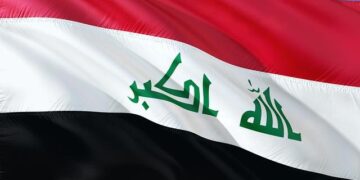In a harrowing escalation of violence in the Democratic Republic of Congo, the Allied Democratic Forces (ADF), a group affiliated with the Islamic State, has been accused of a brutal attack that targeted Christian worshippers in the town of Komanda. Reports from local authorities and eyewitnesses indicate that the armed group launched a deadly assault during a religious gathering, resulting in multiple casualties and prompting widespread condemnation from humanitarian organizations. As the situation unfolds, concerns are mounting over the ADF’s growing influence in the region and the consequences for vulnerable communities caught in the crossfire of escalating extremism. This tragic incident underscores the ongoing struggle for stability in eastern DR Congo, a region plagued by militant activity and humanitarian crises.
ADF Threats Escalate in DR Congo as IS-linked Rebels Target Christian Communities
In a shocking escalation of violence, the Allied Democratic Forces (ADF), a militant group with affiliations to the Islamic State, has intensified its campaign against Christian communities in the Democratic Republic of Congo (DR Congo). Reports indicate that the rebels targeted a group of worshippers in Komanda, leading to a tragic loss of life and raising alarms about the growing influence of extremist ideologies in the region. Witnesses described terrifying scenes as armed assailants stormed a place of worship, resulting in numerous casualties, including women and children who were caught in the crossfire.
The assault on Christian worshippers is part of a broader trend of instability affecting eastern DR Congo, where the ADF has been implicated in a series of violent attacks over the past few months. The group has been accused of employing brutal tactics, including:
- Mass killings
- Kidnappings for ransom
- Destruction of property including churches
- Displacement of local communities
As security forces struggle to maintain control, many fear that the humanitarian crisis will deepen, forcing families to flee their homes. Access to essential services, such as food and medical aid, has also been severely hampered, with local organizations calling for increased international support to address the mounting challenges faced by affected populations.
Community Responses to Violence: Resilience and Calls for International Support
The recent violence perpetrated by ADF rebels in Komanda has sparked widespread outrage and sorrow within the community, leading to a profound display of resilience among local residents. Despite the traumatic events, community members are banding together, organizing vigils and support networks to mourn their lost loved ones while also safeguarding their spiritual and cultural identity. Initiatives are being established to assist affected families, including:
- Community counseling services aimed at providing mental health support.
- Fundraising efforts to aid victims’ families and rebuild places of worship.
- Educational outreach to promote peace and discourage violence.
In addition to local efforts, there is a growing call for international support to address the root causes of such violence and provide assistance in restoring peace. Activists and community leaders are urging global organizations to intervene, emphasizing the need for humanitarian aid and security measures to protect vulnerable populations. A proposed framework for international assistance includes:
| Type of Support | Description |
|---|---|
| Humanitarian Aid | Provision of food, medical care, and shelter for displaced individuals. |
| Security Assistance | Deployment of peacekeeping forces to stabilize affected regions. |
| Accountability Measures | Support for investigations into human rights violations perpetrated by armed groups. |
Addressing the Root Causes of Conflict: Urgent Solutions for Lasting Peace in DR Congo
The recent wave of violence attributed to the Allied Democratic Forces (ADF) in the Democratic Republic of Congo (DRC) has brought to light the urgent need for sustainable interventions that tackle the underlying issues fueling these conflicts. Reports indicate that the ADF, with alleged links to ISIS, has targeted Christian communities in Komanda, reigniting fears among local populations about their safety and security. To effectively counter the ADF’s insurgency, stakeholders must focus on several key dimensions:
- Social Cohesion: Strengthening relationships among diverse ethnic and religious groups is essential for fostering unity and resilience against extremist ideologies.
- Economic Development: Creating job opportunities, particularly for youth, can mitigate disenfranchisement and reduce recruitment into militant groups.
- Effective Governance: Enhancing local governance and justice systems to ensure accountability for violence and to uphold the rule of law will deter groups like the ADF from exploiting lawlessness.
Addressing the multifaceted challenges contributing to instability in the DRC requires an integrated approach that combines humanitarian aid, economic investment, and political reform. The government, in collaboration with international partners, must prioritize initiatives that empower communities vulnerable to radicalization. Developing a comprehensive strategy to counter extremism will not only stabilize regions affected by violence but also pave the way for long-lasting peace and security across the country.
| Root Causes | Proposed Solutions |
|---|---|
| Ethnic Divisions | Promote Intercultural Dialogue |
| Poverty and Unemployment | Invest in Job Creation Programs |
| Lack of Access to Justice | Strengthen Local Judicial Systems |
In Retrospect
In conclusion, the ongoing violence perpetrated by ADF-linked rebels in DR Congo underscores the persistent threat facing vulnerable communities, particularly in regions like Komanda where religious gatherings have tragically become targets of extremism. The alarming patterns of violence not only raise questions about the effectiveness of local and international security measures but also highlight the urgent need for a coordinated response to safeguard civilians and restore peace. As the situation evolves, the international community must remain vigilant and committed to supporting efforts aimed at addressing both the immediate crisis and the underlying issues that fuel such unrest. The call for justice and accountability grows louder, echoing the aspirations of those who seek a future free from fear and violence.














